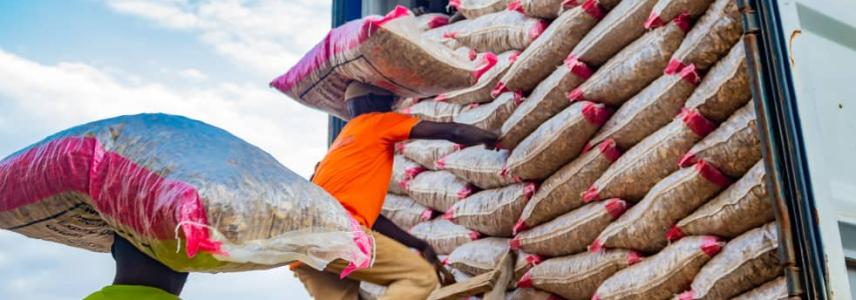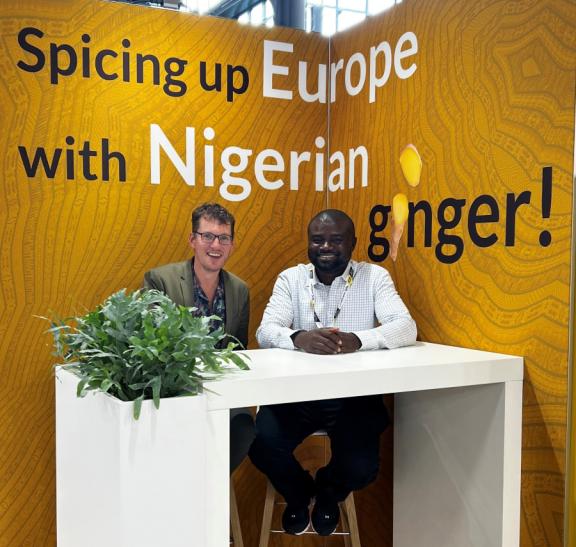The potential of Nigerian ginger for European importers

In recent years, Nigerian ginger has become an important agricultural export. Its unique qualities appeal to buyers worldwide and have helped create new trade relationships. But challenges limit Nigerian ginger's reach in Europe. Ginger blight, market access difficulties and European sustainability standards make it harder for exporters to succeed. To support Nigerian ginger in the European market, CBI works with suppliers to build lasting partnerships with local buyers.
Through its Ginger Nigeria project, CBI collaborates with 17 Nigerian small and medium-sized enterprises (SMEs) to improve their business practices. The project provides training, export coaching, and market linkage support. CBI does this in close collaboration with COLEAD and the Nigerian Export Promotion Council (NEPC). The project helps the SMEs meet European buyer standards and connect with European markets. As a result, they are becoming trusted and responsible suppliers.
Meeting EU quality and sustainability standards
To help build credibility with ginger importers, CBI has introduced essential certifications and promotes sustainable farming practices. Muhannad, CEO of Daraja, explains, "CBI has shown how important these certifications and practices are. This focus has helped us improve our product quality. It also demonstrates to buyers we are committed to high standards."
Dutch importers like Verstegen Spices & Sauces prioritise sustainability and specific certifications. Michel Havermans, Sustainable Sourcing Manager, and Gilmee Davids, Regenerative Agriculture and Climate Manager, say, "To shorten our value chain, we are exploring how to source directly from Nigeria. But this only works if suppliers meet key European Union (EU) market standards on, for example, food safety and Corporate Social Responsibility (CSR)."
CBI not only helps Nigerian companies improve their production processes but also connects them with importers. This pre-selection of reliable suppliers is very interesting to importers like Verstegen. It makes it easier for them to discuss interests, supply chain risks, and specific needs.
Building skills, connections and trust

Experts like Hugo Lamers and Mansoor Raji play key roles in the CBI project. Their insights and support help Nigerian ginger exporters build essential skills and relationships.
Adaku, CEO of Gacon, shares, "CBI connected us with Hugo and Mansoor, who supported us in implementing sustainable sourcing, traceability, and higher quality standards. Now we are ready to meet the demands of European buyers."
Export coach Hugo works with companies to develop a sound export strategy and links them to export markets while ensuring sustainable farming and responsible business practices. Mansoor, a local expert, uses his on-the-ground knowledge to support SMEs in dealing with cultural and logistical challenges. For example, helping them negotiate better and meet contractual terms. This reduces default rates and increases profitability. Hugo explains, "Our role is to help Nigerian businesses succeed in European markets by collaborating on quality standards, relationship-building, and market insights. These steps are essential for long-term success."
Resilience from fighting ginger blight
Nigerian suppliers value the experts' support as they fight ginger blight, a fungal disease that has devastated crops. Losses have reached up to 90% in some areas, disrupting exports to the United States and Europe. CBI has helped set up demonstration plots — special farms where producers test new farming methods. These efforts show importers that Nigeria is working hard to overcome challenges and keep a steady ginger supply.
"The demo plot has been a game-changer for us", Muhannad from Daraja explains. "We experimented with different treatments to see which would best support ginger growth, even with blight risks. Next year, we will share these findings with local farmers to help them improve their yields." For Gacon, the demo plot was an important step towards strengthening their relationship with global buyers. "By actively addressing issues like ginger blight and demonstrating we are committed to quality through innovation, we reassure importers we are dedicated to long-term sustainability, just like them", says Adaku.
Expert Mansoor explains, "The ginger blight situation is an opportunity for meaningful engagement. For importers, it is valuable to see which exporters are resilient and can adapt when facing challenges. Many CSR practices can be seen as 'good initiatives'. But addressing the ginger blight directly with farmers goes beyond typical CSR — it is a real solution, not a marketing effort."
CBI's project has invested significantly in building the 2 businesses' capacity. Their support enables them to offer greater value and confidently enter European markets.
Ethical and transparent sourcing
As consumers want more transparency, ethical sourcing becomes increasingly important to importers. CBI focuses on improving traceability in the supply chains so that companies like Daraja and Gacon can provide detailed information about where their products come from.
Muhannad from Daraja says, "As strange as it may seem, the demo plot is a blessing. Without it, we would not know the best farming practices for the future. The demo plot has helped us innovate, given us know-how and strengthened our ginger crops. We can now share this knowledge with importers, who appreciate the transparency and trust us to provide ethically sourced, high-quality products."
This transparency is a big advantage for importers, helping them meet regulations and satisfy the growing consumer demand for sustainable sourcing. Gilmee from Verstegen explains, "Working with suppliers who engage with farmers directly makes communication lines shorter, improves data sharing, and builds stronger relationships."
Sustainability comes with a price
Transitioning to sustainable business practices requires a significant investment. Buyers should offer fair prices to support these changes. Without this, it will be financially challenging for SMEs to transition to more sustainable practices.
Importers like Verstegen understand the importance of this approach. Michel says, "We aim to build sustainable partnerships with suppliers, supporting diverse and responsible farming practices. Encouraging farmers to grow different crops helps reduce risks for both parties and fits our company's commitment to long-term sustainability. Crop diversity is the practice of growing various crops rather than focusing on one type. This farming approach makes agricultural systems more resilient by lowering the risk of crop failure from pests, diseases, or extreme weather. Crop diversity also supports soil health, boosts biodiversity, and can improve food security by providing a range of nutritious crops. So, flexibility and resilience in agriculture are more valuable than short-term profits, as crop diversity provides real solutions for a sustainable agricultural sector."
A win-win
For European importers like Verstegen, CBI's project adds significant value by offering vetted, high-quality ginger sources outside traditional supply chains. Verstegen recognises the benefits of working with Nigerian suppliers for direct sourcing and shorter supply chains, enhancing both transparency and trust. "Our goal is to build long-term, fair relationships with suppliers who share our commitment to sustainability and transparency," says Michel. Gilmee adds, "Working with CBI-supported SMEs allows us to source ginger responsibly while helping strengthen the sector's resilience."
Nigerian ginger producers are now better equipped to export high-quality ginger that meets European sustainability and transparency expectations. CBI's project, demo plot and technical training sessions supported these SMEs in taking the next step towards more resilient farming and quality control. Their progress is helping Nigerian ginger regain its place in the global market and establish Nigeria as a reliable, high-quality supplier.
Adaku from Gacon sums it up: "CBI has introduced us to valuable markets and given us the tools to sustain our progress. We believe in Nigeria's ginger sector and are proud to show the world its potential."
More information?
Read our market study about the European market potential for ginger. To stay updated on CBI's latest projects and developments, subscribe to our newsletter or join one of our upcoming webinars.